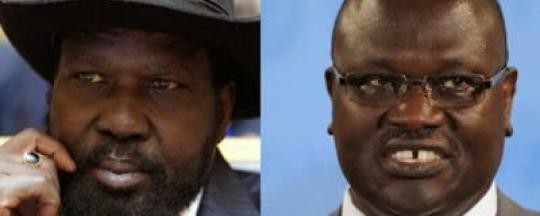Many people have lost their lives because of a problem that could have been resolved politically within the party but due to power interests and tribal political ideologies it has cost us thousands of lives.
In a civilized nation any educated person with a vision for leading his people would always think twice before he could take his people to war in such a way. A wise man would always think about his people rather than his political interest.
But our leaders are not interested in their people’s needs and lives. If they were, why would they have brought us this useless war?
After four months of this senselessness the President and Dr. Riek Machar finally signed a peace accord in Addis Ababa. Signing this peace is a good political move but the question is: How long will the peace accord last?
There is no doubt the document that was signed addresses what South Sudanese need at this time: It recognizes that there is no military solution to the crisis in South Sudan and that a sustainable peace can be achieved only through inclusive political dialogue.
It’s true that there is no military solution to the current conflict but only a political one. So they have agreed “to immediately cease hostile activities within twenty four hours of the signing the document, thus rededicating ourselves to the cessation of hostilities agreement of 23 January 2014.”
I personally think that this document is a good step forward but it needs a commitment from all sides – the government, rebel forces and the IGAD itself. Failure to do so will allow any side to violate it easily.
Even if President Salva Kiir and the rebel leader have agreed “to issue an order to all their respective commands and units, on signing of the agreement, instructing full and immediate cessation of hostilities,” how long will this be honored by Riek Machar’s side since he does not fully control the ‘White Army’? On the other hand, how will an agreement work if Riek’s demand for Kiir to step down is not met?
I don’t think this peace will last because of three reason: (1) Salva Kiir wasn’t 100% for signing the document and his body language shows that he was not really interested except for the sake of saving his political rating in Juba; (2) Riek doesn’t control any major town to make him powerful and to convince the government to accept this peace accord; (3) Riek does not control the White Army that is waging war against the government in Juba.
I am not against peace to come, and I think our leaders need to work for peace rather than working to get into power. I also don’t think people should be targeted because of their tribe. Those who have done this should tried by the International Criminal Court, and indeed they are now scared of the ICC.
They are now scared of the ICC, which is a good thing and it will make them to the do everything so that they cannot be taken to ICC. With this, I think the ICC should use their power to help the people of South Sudan. Although the court does not have power to enforce any arrest warrant against a sitting head of state, their voices are still very important as they have done in Liberia and Ivory Coast. By doing that then the Kiir-Riek peace accord will last longer.
Kiir and Riek’s peace accord will also last if the neighboring countries play a major role as Kenya did during the CPA period. If they don’t then there is no way it will work even if Kiir and Riek have signed it.
The neighboring countries have played a major role because many of their citizens were working in South Sudan and their economies were benefiting, but not anymore due to this war. So, it’s in the best interest of these countries to make sure that South Sudan survives and to push Kiir and Riek to accept peace.
By Maulana Deng




